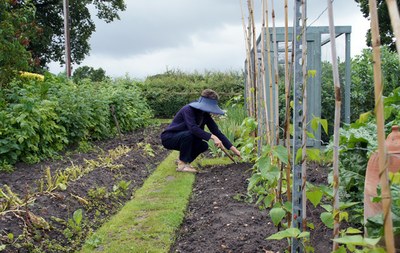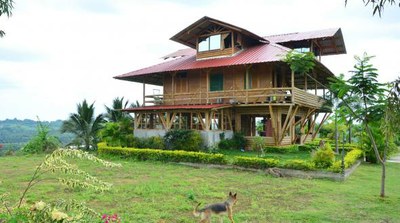Living off the Grid in Ecuador
Want to live in harmony with nature? Tired of paying mountains of utility bills? Want to reduce your carbon footprint by trying something a little different, a little more efficient, and a little more natural? It may be time to try living off the grid.
Our carbon footprint is made up of how much carbon waste we produce: eating unseasonal foods and many meats, using household goods, loss of heat through poor insulation, overall consumption of goods and indirect and direct energy expenditures.
If you are considering minimizing your carbon footprint in a drastic way by living off the grid and adopting an eco-friendly lifestyle, why not consider a new country to begin this adventure?
Living off the Grid in Ecuador
Ecuador, the most bio diverse country on the planet, is one of the only countries that has guaranteed the legal rights of Mother Earth in its Constitution. Ecuadorian's live in harmony with nature. The average carbon footprint in Ecuador is 2 tons. In America, the average carbon footprint is 20 tons of waste.
Not only is property in Ecuador inexpensive in comparison to other retirement destinations, but the land is also filled with natural resources that beckon you to return to nature.
Properties along the coast in Jama, Canoa and Bahía de Caráquez, as well as inland in the Sierra, are abundant in fertile soil and ample water sources. These towns tend to attract similarly minded individuals, individuals who want to live off the grid, reduce their carbon footprint, and live in harmony with nature. If you are interested in learning more about this lifestyle transition, here is a brief overview of information to help you get started.
What is “Living off the Grid?”
Off-grid systems are designed to function without reliance on the electricity grid. In their purest form, these houses and lifestyles operate without the municipal water supply, sewer, natural gas, electric power grid or other similar utilities. Organic farming provides healthy, chemical-free and delicious produce alternatives to the options in many grocery stores or supermarkets.
How do I prepare my property for off the grid living?
Electric
You can generate your own electric power through a variety of alternative energy sources. Solar panels, micro hydropower generators or wind turbines are three of the most popular alternative resources. In Ecuador along the sunny coast, solar energy panels are a feasible option. If you have ample water sources on coastal or inland properties, micro hydropower could work best. If you want to live more inland, in the Sierra communities closer to Cuenca, then harnessing power through wind turbines could be the most efficient alternative.
Natural Gas
For cooking, propane gas is actually one of the cleanest fuels to use, and the government heavily subsidizes it. A refill tank of propane gas costs around $2.50 and it lasts many months. Propane gas has a lower carbon content compared to “natural gas” that is usually pumped through a city, and it can’t hurt water or soil because it is not toxic.
Water
By purchasing a property with a local water source, such as a well, pond, lake or stream, you can create your own clean water source. Pumps or filtration systems may be required depending on what water source you have available. Similarly, depending on how “off the grid” you are willing to go, you will need to invest in a septic tank or a waterless composting system.
Food
Growing a variety of vegetables, fruits and grains is relatively easy in Ecuador compared to other regions and climates. On the coast, tropical fruits like mangoes, limes, bananas and passion fruit grow easily. Grains like rice, quinoa and corn can be harvested in the slighter dryer regions or floodplains. Vegetables also take to the ground quickly. Some common vegetables include eggplants, carrots, zucchini, onions, Swiss chard, lettuce, and arugula.
 After considering these factors, perhaps you’re realizing it is quite feasible to move to Ecuador and live off the grid. A return to living off the grid has become a trend for many individuals from first world countries in the last few decades. While it is not a lifestyle change for everyone, striving to live this self-sufficient way benefits individuals, communities and the environment. If you are interested in locating properties in Ecuador that are ideal for off the grid living, contact John Vollmecke to get started in your new lifestyle.
After considering these factors, perhaps you’re realizing it is quite feasible to move to Ecuador and live off the grid. A return to living off the grid has become a trend for many individuals from first world countries in the last few decades. While it is not a lifestyle change for everyone, striving to live this self-sufficient way benefits individuals, communities and the environment. If you are interested in locating properties in Ecuador that are ideal for off the grid living, contact John Vollmecke to get started in your new lifestyle.
Resources
https://en.wikipedia.org/wiki/Off-the-grid
http://makewealthhistory.org/2008/04/08/carbon-footprints-what-makes-the-biggest-difference/
http://visualeconomics.creditloan.com/the-true-cost-of-living-off-the-grid/
http://classroom.synonym.com/effects-propane-environment-16139.html

